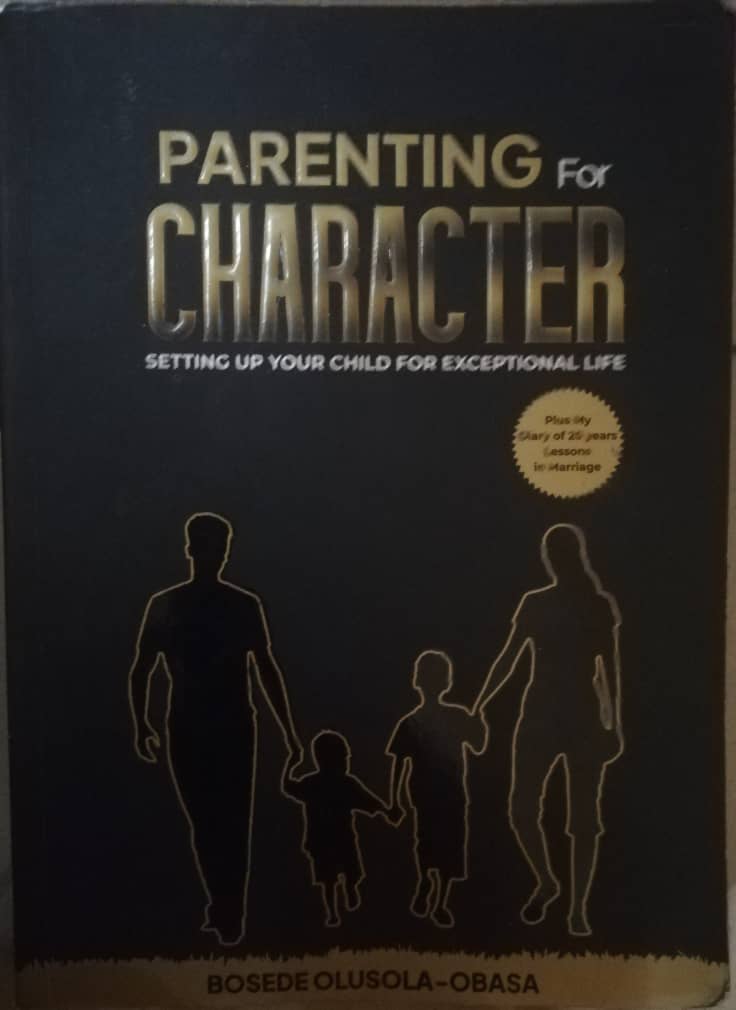Title of Book: Parenting for character (setting up your child for an exceptional life)
Author: Bosede Olusola-Obasa
Publisher: Mind Your Character with Bosede Olusola-Obasa Book Series
Pages: 249
Reviewer: Azeezat Adeshola
When we think of raising children, the focus is often on education, talent and success. But hidden in the quiet folds of true parenting lies a more lasting treasure: character. In Parenting for Character, Bosede Olusola-Obasa reminds us that raising upright children is not a side project — it is the very foundation of a stable society.
The book opens with a clear purpose: to guide parents through the journey of building their children’s character by focusing on what truly matters. Olusola-Obasa divides her approach into the 9 Ps — Privilege, Purpose, Process, Principles, Pattern, Practice, Prioritise, Partnership, Pain — a framework that offers parents a roadmap for shaping the next generation.
Through her writing, Olusola-Obasa re-centres parenting where it belongs — in the home — and firmly places the responsibility of character-building on the shoulders of fathers and mothers. Drawing from her extensive work with platforms like the National Character Parenting Summit (NCPS), she stresses that while schools and society are partners in this task, the real architects of a child’s soul are the parents.
She introduces readers to the four types of parenting – Authoritative, Authoritarian, Permissive, and Absent – and openly acknowledges how no parent fits perfectly into one category. This honesty about her mixture of parenting styles adds a relatable touch for anyone navigating the challenges of raising children in today’s world. I found myself evaluating my own upbringing, which embodies elements of all four styles — quite a revelation! Olusola-Obasa also takes the time to explain character traits in alphabetical order on page 62, allowing parents to pinpoint and nurture qualities like discipline, honesty, and resilience in their children.
READ ALSO: Tunde Bakare and Nigerian politics: The pontifical and episcopal community in perspective
What truly sets this book apart is Olusola-Obasa’s transparency. She doesn’t present herself as the perfect parent; instead, she offers a realistic and relatable approach, sharing real-life experiences, including her own struggles as a mother. Her reflections on 21st-century parenting — especially the pressures faced by both parents and children — are insightful. She discusses the overprotective parent archetype, one who believes shielding children from the world will somehow create perfect, obedient adults. But as Olusola-Obasa wisely points out, this neglects the critical role of communication. Parents cannot simply impose rules and expect compliance; they must communicate, teaching their children to navigate the world with wisdom and understanding. Without this key element, mistakes and regrets will inevitably follow.
In a world that often looks outside the home for solutions to the character crisis of the next generation, Parenting for Character calls parents back to their primary mission: to nurture integrity, resilience, and godliness in their children — starting from the living rooms, not the classrooms.
In Chapter 10, Obasa takes a deep dive into the complexities of marriage and its influence on parenting. She shares her personal experiences, including the struggles and growth that come with balancing marriage and raising children. This chapter highlights how the strength of the parental union shapes the environment in which a child grows. Obasa’s acknowledgment that both the spiritual and practical aspects of child-rearing must be balanced resonates with readers, reminding us that good parenting is not only about sacrifice but about understanding and adapting to the evolving dynamics of family life.
Parenting for Character is not just a guide — it is a call to parents to prioritize what truly matters. As James E. Faust wisely said: “To be a good father and mother requires that the parents defer many of their needs and desires in favour of the needs of their children. As a consequence of this sacrifice, conscientious parents develop a nobility of character and learn to put into practice the selfless truths taught by the Savior himself.”
This sacrificial love is the bedrock upon which character is built, and Olusola-Obasa demonstrates that the work of character-building is not an easy one. It is a process filled with both pain and joy, but the rewards — a generation rooted in integrity and resilience — are worth every step.
In a world that often looks outside the home for solutions to the character crisis of the next generation, Parenting for Character calls parents back to their primary mission: to nurture integrity, resilience, and godliness in their children — starting from the living rooms, not the classrooms.
The writing is thoughtful and rich, but at times, the complex grammar and layered concepts can make it a bit challenging to grasp the ideas on the first read. Some parts may require readers to slow down and reflect for a better understanding. This depth only emphasizes Olusola-Obasa’s commitment to addressing parenting with the seriousness it deserves.
While the book does not lean heavily on graphics or flashy designs, its strength lies in the richness of its message. The clean layout allows Olusola-Obasa’s words to take centre stage, ensuring that readers focus on the weighty issues at hand without unnecessary distraction.
Olusola-Obasa doesn’t just offer advice, she offers a vision — one in which families become the first, and finest, builders of a nation’s moral fabric.














